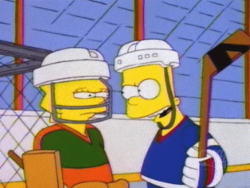 Impulse Control
Impulse ControlI was recently teaching a clinic and a concerned coach told me of a problem she was having with one of her players. He supposedly is a great kid on and off the ice, but was prone to angry outbursts on occasion. Mom and Dad were very supportive and they were looking at ways to help this young fellow (12 years old).
I asked her when these outbursts generally occurred and she said generally near the end of the game (as I suspected).
MY suggestion to her was that she needed to teach this player how to control his impulses during a game. Clearly what was happening to the young fellow was that he was getting into a spiral of anxiety in which the end result was a complete emotional meltdown near the end of games. There are a couple methods in dealing with players like this.
1-Sell each shift as a complete entity of their own. Teach the player that hockey is comprised of many shifts and each one, good or bad, must be left on the ice each time. One thing I did one time with a player was to wrap an elastic band on their glove (Make sure its one that can survive without breaking and ending up on the ice). At the end of each shift, the player was instructed to take 10 deep breaths and imagine each breath was either a) a wheel that neede to be driven harder (for players that are playing lacklustre) or b) waves leaving the body (to calm). At the end of the 10 breaths, the player was instructed to pull on the elastic band and let it snap. Have the player concentrate solely on the sound of the snap and when the snap is done, the shift is over.This is something I learned from Dr. Saul Miller.
2-When a player comes to the bench in obvious anxiety, sit them down, give them a drink of water and ask them to count the amount of lights in the neutral zone. I don't know of the exact science here, but there is something about raising ones eyes upward that doesn't allow you to access the emotional part of the brain.
3-Sell the players on the concept that the bench is "home" and that you never come "home" with your head down. This creates a feeling that the bench is a safe place for all players, which has a calming effect on players. The way some coaches act on the bench, it's not small wonder that players are terrified to come "home."
Till the next time, remember that we don't coach hockey, we coach kids!